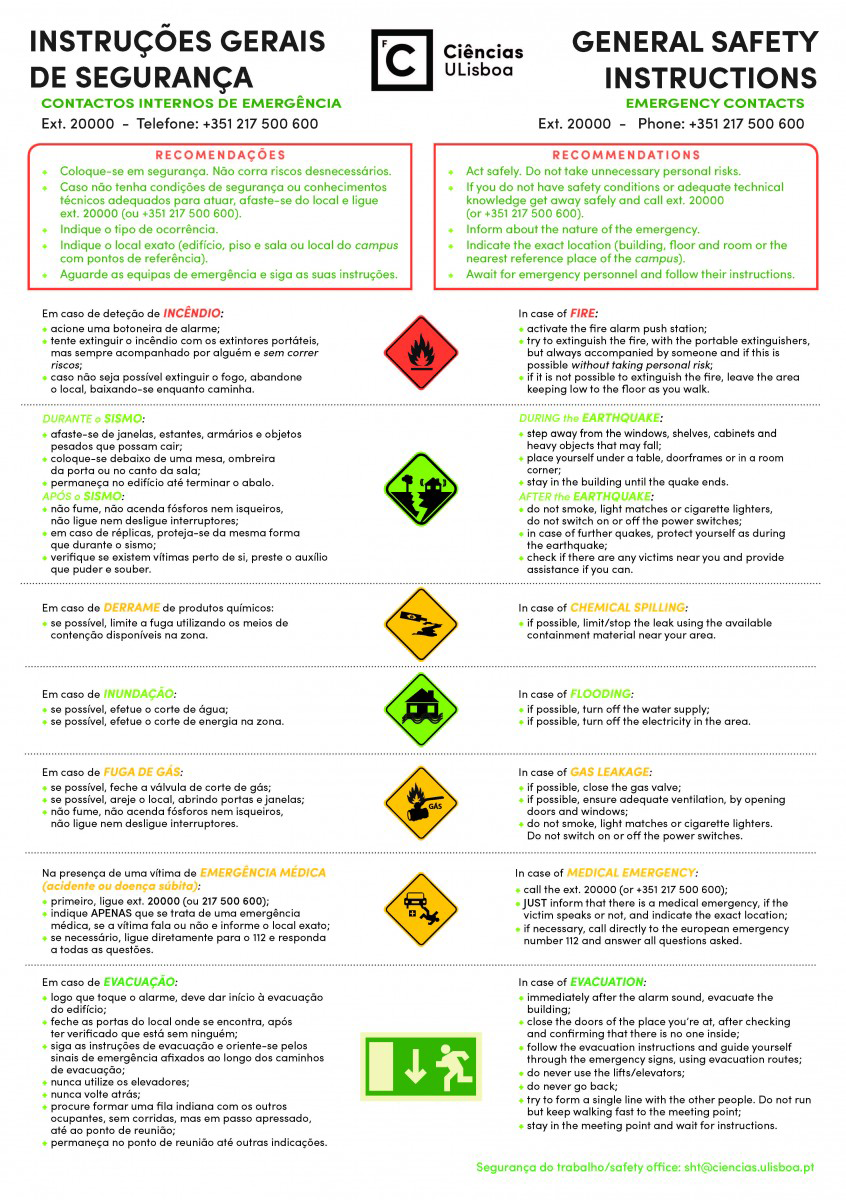First aid at CIÊNCIAS
What to do?
If you detect a medical emergency that originated in an accident or sudden illness, guarantee your own safety and:
- Stay calm;
- Identify the location of the occurrence (building, floor, room or place on campus with the closest reference points);
- Call extension: 20000 (or 217 500 600);
- ONLY indicate that it is a medical emergency, if the victim speaks or not and inform the exact location;
- Don’t waste time with irrelevant information;
- Call 112 immediately. Answer all the questions that are asked;
- The call to 112 can be made from ANY TELEPHONE at FCUL.
CIÊNCIAS is equipped with procedures, material means and a team of trained workers to stabilize and save the life of victims from lesions or sudden disease.
If you detect a medical emergency that originated in an accident or sudden illness, guarantee your own safety and:
- Stay calm;
- Identify the location of the occurrence (building, floor, room or place on campus with the closest reference points);
- Call extension: 20000 (or 217 500 600);
- ONLY indicate that it is a medical emergency, if the victim speaks or not and inform the exact location;
- Don’t waste time with irrelevant information;
- Call 112 immediately. Answer all the questions that are asked;
- The call to 112 can be made from ANY TELEPHONE at FCUL.
Specific first aid plan at CIÊNCIAS available here (only available to registered CIÊNCIAS users)
Access to 112
In the case of sudden disease or accident that leads to serious injuries, call extension 20000 (Surveillance Station). Then, call 112 immediately.
Access to the european emergency number is available from any telephone at FCUL (even if you don’t have access to an external network) by lifting the handset and dialling 112.
Notice: Access to 112 has already been tested and is operational. False calls puts the lives of people who really need immediate help in danger.
When contacting 112, you should follow these recommendations which are also available on the INEM website:
- Your collaboration is essential:
- Provide all the information that is solicited to allow for a quick and effective aid to the victims.
- Inform in a simple and clear manner:
- The type of situation (illness, accident, childbirth, etc.);
- The exact location and whenever possible indicate the reference points;
- The apparent number, sex and age of the people who need aid;
- The main complaints and changes that you observe;
- The existence of any situation that demands providing other means of assistance to the location, for example, the release of gases, fire hazard, etc.
- After the triage of the situation is made:
- The CODU operators will indicate the best way to proceed by sending – if necessary – the adequate means of assistance;
- Remember that the INEM ambulances should only be used in imminent life-threatening situations;
- In case it is not necessary to send an INEM ambulance all the information regarding the best way to transport the patient to the adequate health unit will be given.
- Hang up the phone only when indicated by the operator.
- Next time you call 112 remember to:
- Provide all the information that is solicited to allow for a quick and effective aid to the victims.
Automated external defibrillator (AED) programme
CIÊNCIAS has an AED programme that is duly licensed by INEM.
There are four AED pieces of equipment (one in the first aid kit located at C5, in the first aid kit located at C8, one at the C6 building entrance and one at the C3 building concierge) and 21 FCUL members have training in basic life support/automated external defibrillator.
CISI 2021 - International Congress on Integrated Safety
The abstract of CIÊNCIAS first aid plan was approved for poster presentation at the 2nd International Congress on Integrated Safety - CISI 2021.
INEM’s video channel
INEM has a series of information available on video, which can be useful in case you have to deal with an emergency situation:
Help save lives – chain of survival INEM
Lesson 1 – What to do in the case of an emergency?
Lesson 2 – Approaching a victim that isn’t breathing
Lesson 3 – Obstruction of the airway
Lesson 4 – Fainting
Lesson 5 – Controlling external bleeding
Lesson 6 – Obstruction of airways in babies
Lesson 7 – Obstruction of airways in children
Lesson 8 - Seizures


